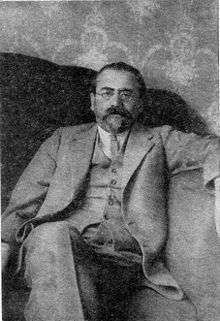Theodore Rothstein
Theodore Rothstein (Russian: Фёдор Аронович Ротштейн, Fyodor Aronovich Rotshteyn; 14 February 1871 – 30 August 1953) was a journalist, writer and communist. He served as a Soviet ambassador in the 1920s.

Life
Theodore Rothstein was born in 1871 in the Imperial Russian city of Kovno, Kovno Governorate (present-day Kaunas, Lithuania), into a Jewish family.
Rothstein left Russia in 1890 for political reasons and settled in the United Kingdom. He worked as a journalist in the area of foreign policy for The Tribune, the Daily News, The Manchester Guardian, and became a member of the National Union of Journalists.[1] Furthermore, he was active in London as a correspondent for several radical Russian newspapers. Rothstein also wrote articles for Die Neue Zeit, the organ of the Social Democratic Party of Germany (SPD), which represented the direct way of a consistent Marxism and in which took place debates regarding Marxism and socialism.
In 1895, he joined the Social Democratic Federation (SDF) which was founded by H.M. Hyndman in 1884.[2] Rothstein occupied the left-wing of the party as a prominent theorist and forward thinker, and in 1900 he was elected to its executive. Within the SDF's successor, the British Socialist Party (BSP), he was a leader of the opposition to Hyndman's support for the war. After Hyndman and his supporters left the BSP, Rothstein became a leading figure in the formation of the Communist Party of Great Britain. He also joined the Russian Social Democratic and Labour Party as a British member in 1901, siding with the Bolshevik faction against the Mensheviks and becoming a close comrade of Lenin, who often stayed at Rothstein's house on Clapton Square in the Hackney area of London.
Rothstein published "Egypt's Ruin" (1910), an analysis of Egypt's systematic exploitation by the British after the occupation, evidenced by British government documents and correspondent reports from London newspapers regarding Egypt. Although Rothstein was a convinced opponent of World War I, he worked for the Foreign and Commonwealth Office and the British War Office as a Russian translator and interpreter.
However, following an invitation to Moscow in 1920, he was refused permission to return to Britain.[3] He remained in Russia, became a member of the Bolshevik Party, took on the chairmanship of the "University reform commission" (1920–1921).
Soviet Ambassador to Iran
On 6 January 1921 Rothstein was accredited as the Ambassador to Tehran and departed for the posting on 6 February after having had a discussion with Lenin. He took with him an abnormally large entourage of 150 people.[4]
Later career
From 1922 on he was a member of the "Collegium of the People's Commissariat for Foreign Affairs". Rothstein was appointed director of the Institute of World Economy and Politics in Moscow.
Rothstein's son, Andrew, remained in Britain became a prominent communist.
Rothstein died in Moscow in 1953.[1]
References
- Burke, David (2018-02-08). Russia and the British Left: From the 1848 Revolutions to the General Strike. Bloomsbury Publishing. ISBN 978-1-78673-324-5.
- Burke, David (2008). The Spy who Came in from the Co-op: Melita Norwood and the Ending of Cold War Espionage. Boydell & Brewer Ltd. ISBN 978-1-84383-422-9.
- Udy, Giles (2017-04-27). Labour And The Gulag: Russia and the Seduction of the British Left. Biteback Publishing. ISBN 978-1-78590-265-9.
- Cosroe Chaqueri (1994), The Soviet Socialist Republic of Iran, 1920-21: Birth of the Trauma, University of Pittsburgh Press, OCLC 831417921, OL 25431986M
Works
- The Decline of British Industry, 1903.
- The Russian Revolution, 1907.
- Egypt’s Ruin, A Financial and Administrative Record, London, 1910.
- Essays in the History of the British Labour Movement.
- From Chartism to Labourism - Historical Sketches of the English Working Class Movement, Dorrot Press Ltd., London, 1929.
Sources
- Theodore Rothstein, From Chartism to Labourism - Historical Sketches of the English Working Class Movement, Dorrot Press Ltd., London, 1929.
- Theodore Rothstein biography - Marxists Internet Archive
- Compendium of Communist Biography by surname - Graham Stevenson, National Organiser for the Transport and General Workers Union
External links
- Theodore Rothstein at the Marxists Internet Archive
- Theodore Rothstein - Russian article about Rothstein with his photo